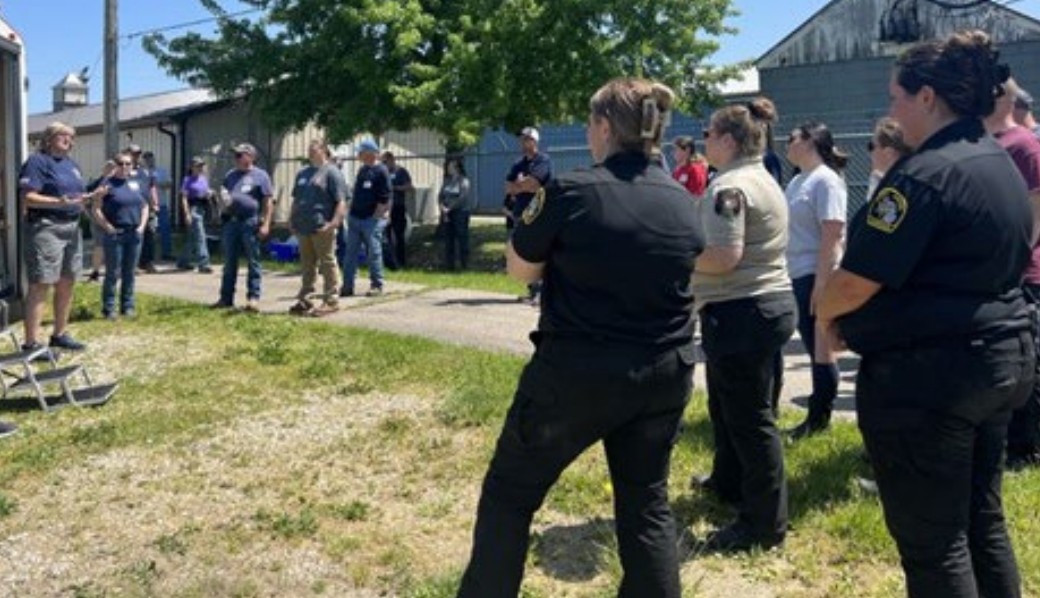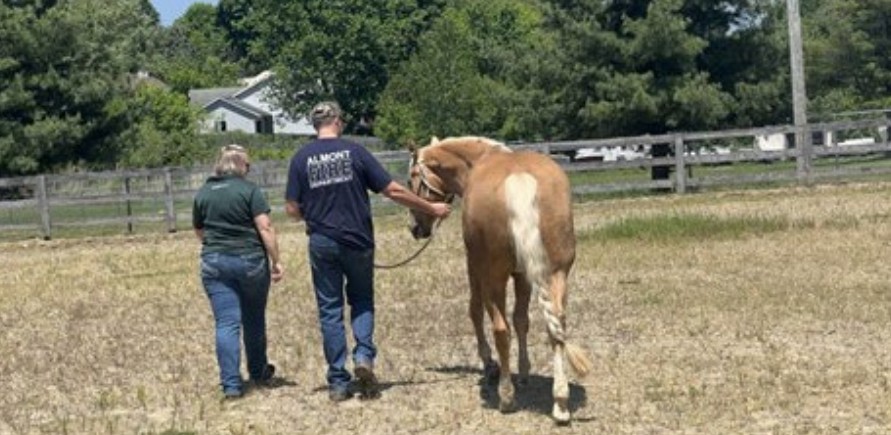
MSU Extension Emergency Response to Accidents Involving Livestock Program has Statewide, National and International Impacts
DOWNLOADAugust 4, 2025 - Michigan State University Extension
- 16 million head of livestock in Michigan (U.S. Department of Agriculture National Agricultural Statistics Service, 2023)
- Over 800 first responders trained through the ERAIL program
- 21 successful ERAIL training since its inception in 2019
Public Value
The Emergency Response to Accidents Involving Livestock (ERAIL) program enhances public safety, promotes animal welfare and supports agricultural resilience by equipping first responders and animal agriculture industry professionals with tools to address livestock transport emergencies. Through its national and international expansion, ERAIL is globally improving response strategies and setting a new standard for livestock transport safety.
Impacts
- 9 response trailers placed or committed across the state
- 18 counties plus one bordering out-of-state city are active partners for the ERAIL response trailers
"We really appreciate MSU Extension's work on Emergency Response to Accidents Involving Livestock. This is an amazing program. It has helped define what type of training is needed locally." 2024 ERAIL program participant
Expanding the ERAIL Program: National and International Impact

Accidents involving livestock during transportation present significant challenges for public safety, animal welfare and industry efficiency. Effective emergency response is critical to minimizing harm during such incidents, but many regions lack structured programs for training responders. The ERAIL program, developed by MSU Extension, addresses this need by providing comprehensive training to first responders, MSU Extension educators and agricultural professionals. As the program grows, it has become a model for enhancing livestock transport safety and response capacity across Michigan, the U.S. and internationally. In 2024, ERAIL team members extended the program’s reach through presentations, webinars and workshops.
International engagement
A team member presented “Preparing for Livestock Transport Accidents: The Michigan Example” at the Encuentro Latinoamericano de Bienestar Animal in Santiago, Chile to 30 veterinarians, producers and agronomists across Latin America.
Additionally, 100 veterinarians from Mexico participated in a webinar hosted by the Mexican Association of Veterinarians that specialized in food safety and quality.
National Recognition
The ERAIL program earned the National Association of County Agricultural Agents "Search for Excellence Award for Livestock Production," receiving accolades at state, regional and national levels. At the national conference, 75 agricultural agents attended a presentation highlighting ERAIL’s success. Extension Disaster Education Network (EDEN): ERAIL was featured in a breakout session at EDEN’s annual conference in Salt Lake City, Utah, where 25 Extension educators learned about implementing the program in their regions. The ERAIL program’s expansion demonstrates its growing impact:
- Increased awareness of livestock transport
safety issues among national and
international audiences. - Recognition by leading agricultural
organizations for program excellence and
innovation. - Requests from other states and countries to
adapt the ERAIL program for local needs,
highlighting its value as a replicable model.
"I'd love to have a program similar to ERAIL in Kansas. I plan to advocate bringing this program to our state. A fleet of ERAIL response trailers is greatly needed in our state." Member of the Kansas Emergency Management Department of Agriculture
- 130 veterinarians, producers and agronomists across Latin America and Mexico attended trainings, exposing them to the ERAIL program
- 2 national conferences highlighted the ERAIL program to over 100 program attendees
Comprehensive Hands-On Training Continues to be a Flagship Component of the ERAIL Program

In 2024, the MSU Extension ERAIL team hosted two intense, one-day ERAIL trainings in Imlay City and East Lansing focused on preparedness for first responders in Michigan. Over 100 people attended these two trainings, bringing the total number of people trained in the ERAIL program to over 800. These trainings helped response teams plan for and respond to rollover accidents involving livestock. They focused on managing the scene of an accident, organizing volunteers and working to ensure public safety and animal welfare. Participants learned about extricating trapped animals from trucks/trailers, managing a rollover accident incident, chain of command, safe handling of large animals, and humane euthanasia techniques for severely injured animals.
Combining both in-class and hands-on training, participants gained and enhanced their skills on animal behavior and handling. Participants at both locations were surveyed regarding the training and responded with overwhelming success. One hundred percent of program
participants indicated they increased their knowledge and skills when providing emergency response to accidents involving animals. Additionally, 100% of attendees had a significant
increase in their awareness, available resources, the skills and people needed to respond properly to a livestock transportation accident.
One of the unique successes of this program was the collaboration with the Kansas Department of Agriculture's Emergency Management Division at the October training. Following the input and guidance from the animal agriculture industry in Kansas, the Emergency Management Division was looking for information that could meet the needs of their industry by addressing preparedness for accidents involving livestock. Through research and connections with Michigan Department of Agriculture and Rural Development (MDARD) Emergency Management division, two members from Kansas’s department leadership team attended the ERAIL training, including an informational session with ERAIL team members the night prior to the training.
The experience reinforced the importance of replicating this training in Kansas and led these representatives to advocate for ERAIL training in the state.
“I’d love to have a program similar to ERAIL in Kansas,” a member of the Kansas Emergency Management division said. “I plan to advocate bringing this program to our state. A fleet of ERAIL response trailers is greatly needed in our state.” He also credited the success of the ERAIL program to the work of the MSU Extension ERAIL team. He indicated that his biggest concern with replicating the ERAIL program in Kansas is that he wouldn’t have a group like Michigan’s ERAIL team that functions well together, connects meaningfully with responders and provides easy to understand education.
- 100% of program participants increased their knowledge and skill when responding to accidents involving animals.
- 100% of program participants significantly increased their awareness of available resources, essential first responder skills and the personnel needed for responding to an accident involving livestock.
"This training made me think more about handling animals and safety, especially when working with downed animals." Imlay City ERAIL program participant
Strategic Placement of ERAIL Trailers Across Michigan
In 2024, MSU Extension strategically placed nine ERAIL trailers throughout Michigan. Each trailer is equipped with state-of-the-art livestock handling and containment equipment, in addition to the tools and supplies that are essential to an effective and efficient accident response. MSU Extension hosted a series of ribbon-cutting ceremonies to unveil ERAIL trailers across the state, enhancing local emergency response for livestock incidents. Counties where ERAIL trailers were placed in 2024 included Monroe, Midland, Berrien, Lapeer and Gratiot counties, with one more trailer committed to an Upper Peninsula County. This brings the ERAIL response trailer fleet to a total of nine trailers prepared and ready for deployment when needed.
Along with the placement of these response trailers, MSU Extension delivered a series of highly successful ERAIL trailer training events within three of the five counties where trailers were placed. The other two locations for trailer training are scheduled to take place in 2025. The purpose of these ERAIL trailer trainings is to 1) create awareness that this respective resource exists and how to access it, and 2) familiarize first responders with the trailer equipment by providing scenario-based activities while utilizing the ERAIL trailer and equipment as a central educational tool.
"Thank you so much, I greatly appreciate it!" Gratiot County animal control officer
These trailers, which are equipped with livestock handling equipment and strategically placed around Michigan, emphasize the importance of emergency preparedness for livestock-related incidents, strengthening local resilience and ensuring communities are better equipped to handle agricultural emergencies. The partnership and support that MSU Extension, MDARD, local officials and community leaders have dedicated to the ERAIL program showcases the growing collaboration to improve preparedness and infrastructure for agricultural emergencies statewide. The work being done collectively highlights the ongoing expansion of the ERAIL initiative across Michigan, which is a testament to the collective effort and commitment of all involved.
- 100% of participants increased their skill level in handling livestock because of attending ERAIL training
- 96% of participants increased their knowledge of the ERAIL program, including where trailers are located, how to access a response trailer and how to use the equipment inside the trailer.
"Thank you! Incredible experience that brought insight and was a lot of fun and very informative. After going through this training, our goal is to develop a response plan for our area." Slaughter processing plant employee
ERAIL Trailer Utilized for Incident Response
Preparing for the unexpected is the concept that MSU Extension’s ERAIL team instills in the first responders who attend their training. The team puts response trailers in place and provides comprehensive training for those who may use them, hoping it will never come to fruition. However, in early June 2024, that was not the case for the ERAIL trailer and responders in Branch County.
On I-69, a major highway in Michigan, a blown tire caused a fire in a large cattle hauler. The semi-truck driver with a 48-foot-long aluminum and wood floor trailer with 33 cattle inside pulled off the side of the northbound lane and called for assistance. Local fire departments and the Branch County Sheriff’s Department responded, deploying the ERAIL response trailer placed at Branch County Animal Control. The equipment housed in the trailer was used to handle livestock at the crash scene and to control the transfer between haulers. Law enforcement closed the northbound lane for nearly an hour before opening a northbound single lane. First responders at the scene indicated that the equipment provided in the ERAIL trailer, as well as having responders who were properly trained, were extremely useful in this situation.
Having direct access to the tools and equipment needed to respond to an incident involving livestock is critical for an efficient response. This combined with responders that are properly trained for these types of situations is the difference between a controlled response and complete chaos. By providing these resources and training, the ERAIL program works to protect the safety of first responders, the public traveling the roadways and the wellbeing of the animals involved.
"The training was very useful. The firefighters and deputies understand the need to use their equipment to block the view of the one lane of traffic still moving. Amazingly, we were off the highway in two hours because we had direct access to the equipment we needed." Animal control officer who deployed the trailer to the scene



 Print
Print Email
Email




